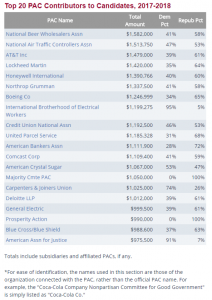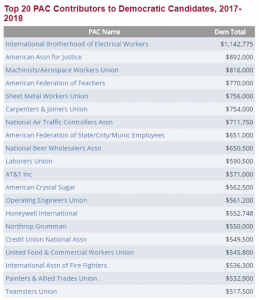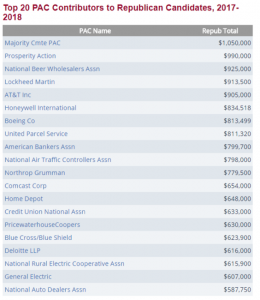3a SPOTLIGHT – PACs and Super PACs
11th May 2018
SPOTLIGHT: PACs and Super PACs
WHAT IS A PAC?
- political action committee(PAC) is a type of organization that pools campaign contributions from members and donates those funds to campaign for or against candidates, ballot initiatives, or legislation
- legal term PAC has been created in pursuit of campaign finance reform in the United States.
- This term is quite specific to all activities of campaign finance in the United States.
- At the U.S. federal level, an organization becomes a PAC when it receives or spends more than $1,000 for the purpose of influencing a federal election, and registers with the Federal Election Commission, according to the Federal Election Campaign Act as amended by the Bipartisan Campaign Reform Act of 2002 (also known as the McCain-Feingold Act).
- At the state level, an organization becomes a PAC according to the state’s election laws.
HOW CAN A PAC SPEND AND RAISE MONEY?
- Contributions from corporate or labour union treasuries are illegal, though they may sponsor a PAC and provide financial support for its administration and fundraising;
- Union-affiliated PACs may only solicit contributions from members;
- Independent PACs may solicit contributions from the general public and must pay their own costs from those funds.
- Federal multi-candidate PACs may contribute to candidates as follows:
- $5,000 to a candidate or candidate committee for each election (primary and general elections count as separate elections);
- $15,000 to a political party per year; and
- $5,000 to another PAC per year.
- PACs may make unlimited expenditures independently of a candidate or political party
Link to Unit 4C: In its 2010 case Citizens United v. FEC, the Supreme Court of the United States overturned sections of the Campaign Reform Act of 2002 (also known as the McCain-Feingold Act) that had prohibited corporate and union political independent expenditures in political campaigns. Citizens United made it legal for corporations and unions to spend from their general treasuries to finance independent expenditures related to campaigns, but did not alter the prohibition on direct corporate or union contributions to federal campaigns. Organizations seeking to contribute directly to federal candidate campaigns must still rely on traditional PACs for that purpose.
WHAT ARE SUPER PACS AND HOW CAN THEY SPEND AND RAISE MONEY?
Super PACs, officially known as “independent-expenditure only committees”, may not make contributions to candidate campaigns or parties, but may engage in unlimited political spending independently of the campaigns. Unlike traditional PACs, they can raise funds from individuals, corporations, unions, and other groups without any legal limit on donation size.
Super PACs were made possible by two judicial decisions: the aforementioned Citizens United v. Federal Election Commission and, two months later, Speechnow.org v. FEC. In Speechnow.org, the federal Court of Appeals for the D.C. Circuit held that PACs that did not make contributions to candidates, parties, or other PACs could accept unlimited contributions from individuals, unions, and corporations (both for profit and not-for-profit) for the purpose of making independent expenditures.
The result of the Citizens United and SpeechNow.org decisions was the rise of a new type of political action committee in 2010, popularly dubbed the “super PAC”.[20] In an open meeting on July 22, 2010, the FEC approved two Advisory Opinions to modify FEC policy in accordance with the legal decisions. These Advisory Opinions were issued in response to requests from two existing PACs, Club for Growth, and Commonsense Ten, which later became Senate Majority PAC. The opinions gave a sample wording letter which all Super PACs must submit to qualify for the deregulated status, and such letters continue to be used by Super PACs up to the present date. FEC Chairman Steven T. Walther dissented on both opinions and issued a statement giving his thoughts. In the statement, Walther stated “There are provisions of the Act and Commission regulations not addressed by the court in SpeechNow that continue to prohibit Commonsense Ten from soliciting or accepting contributions from political committees in excess of $5,000 annually or any contributions from corporations or labor organizations.” (emphasis in original)
The term “Super PAC” was coined by reporter Eliza Newlin Carney. According to Politico, Carney, a staff writer covering lobbying and influence for CQ Roll Call, “made the first identifiable, published reference to ‘super PAC’ as it’s known today while working at National Journal, writing on June 26, 2010, of a group called Workers’ Voices, that it was a kind of ‘”super PAC” that could become increasingly popular in the post-Citizens United world.'”
According to FEC advisories, Super PACs are not allowed to coordinate directly with candidates or political parties. This restriction is intended to prevent them from operating campaigns that complement or parallel those of the candidates they support or engaging in negotiations that could result in quid pro quo bargaining between donors to the PAC and the candidate or officeholder. However, it is legal for candidates and Super PAC managers to discuss campaign strategy and tactics through the media.




0 Comments